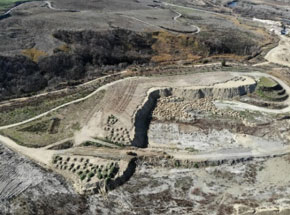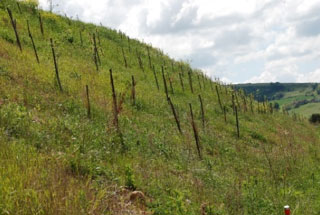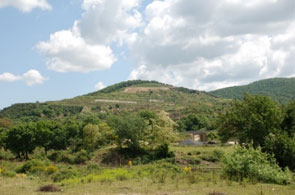Materials
Responsible sourcing of materials
NSG Group aims to meet the requirement of the UN Sustainable Development Goal 12 to use natural resources sustainably.
Where possible, NSG Group implements circularity measures to prevent the generation of waste and mitigate negative impacts when it is generated. We aim to retain the value of products, components and materials that are circulating in the economy.
Our principal raw materials are mineral in nature, therefore we have a particular obligation to ensure that, in obtaining those minerals, natural habitats and biodiversity are preserved or enhanced.
We will responsibly manage all materials in proportion to their environmental risk and exercise responsible stewardship of those lands for which we are accountable. (from NSG Sustainability Policy)
Before a raw material is approved for use by NSG an auditing process is carried out to ensure the material meets the requirements for its use in glass making and conforms to our ethical sourcing policies. In the case of mined or quarried materials this will involve a site visit to check that the supplier has extraction rights and approvals, including remediation plans, in place.
Regularly monitor, minimize and safely use hazardous chemicals and encourage the re-use and recycling of materials.
Encourage co-operation with our customers and suppliers to facilitate good environmental practices and to promote the efficient use, reuse, recovery and recycling of glass and other materials involved in glass manufacture, processing, packaging, and delivery. (from NSG Environmental Policy)
The principal raw materials used in the manufacture of soda-lime silicate glass are sand, sodium carbonate (synthetic or natural origin), dolomite, limestone, feldspar or nepheline syenite, sodium sulphate, carbon in the form of anthracite or pet coke and cullet. Cullet is crushed glass which originates from various sources including glass manufacture and processing and recovery of used parts. To contribute to our SBT objective, NSG Group will continue working on replacing virgin raw materials with crushed glass cullet.
Flat glass making may also involve use of small amounts of some additives mentioned as materials of concern in the Drive Sustainability Material Report. These include iron (rouge), titania (in both natural and synthetic form), cobalt (in the less hazardous Co3O4 form) and ceria where these confer specific optical properties to glass for special applications. NSG uses the minimum feasible amount of these additives and all are sourced ethically as described above.
During the synthesis of glass, all raw materials react together in the furnace at approximately 1,550℃ and form a new single constituent substance glass, with the exhaust of gases NOx, SOx and CO2.
Purchased amount in CY24(kt)
| Sand: |
2109
|
| Soda ash:
| 640 |
| Dolomite:
| 556 |
| Limestone:
| 138 |
| Good glass bought in:
| 189 |
The majority of our raw materials are sourced from third party suppliers, however, NSG Group has minority shares in Lochaline Quartz Sand (Scotland), MI Tunisia and ViCo (Vietnam) and wholey owns Melfi sand quarry in Italy. The last of which provides 5% of our Group sand consumption.
Restoration and Biodiversity at the Sand quarry at Melfi, Italy
The NSG Group owns and operates a sand quarry at Melfi, Region Potenza, in Italy. This quarry is located in the mountainous area in the valley of the Ofanto river.
At this open mine, sandstone is taken from the ground and is crushed by shredder and milling equipment to produce silica sand for melting to glass at NSG sites in Italy.
Water is taken from the Ofanto river to wash the sand. The water is given back to the river after sedimentation of particles from the washing process. Unwanted natural material from the mining operation as well as the sedimented material from the washing process is then filled into the finished quarry areas for restoration purposes. The restoration areas are then planted with trees and other plants which occur in the local habitat to minimize the impact on biodiversity. The selection of the plants is done in close cooperation with experts from local authorities.
 Re-filling and restoration of the sand quarry at Melfi
Re-filling and restoration of the sand quarry at Melfi Planted trees at finished areas at the Melfi sand quarry
Planted trees at finished areas at the Melfi sand quarry Reduced visual and biodiversity impact after restoration of finished parts of the sand quarry at Melfi
Reduced visual and biodiversity impact after restoration of finished parts of the sand quarry at Melfi
Smaller quantities of chemicals and materials are used for glass coating, laminating, IGU manufacture, automotive value added components and technical glass.
Please refer to the "Conflict Minerals" under "Governance" section.
Our management systems identify hazardous substances and NSG Group engages with suppliers to use less harmful alternatives where possible. R&D actively reformulate products to eliminate hazardous substances e.g. we have recently removed nickel as a tinting additive in our glass. Chemicals are not required for the glazing products during their operational use. At the end of its life, all glass sold can be recycled as cullet if adequately segregated for re-incorporation back into glass.
In 2019, NSG Group implemented new environmental reporting software that will allow all raw materials to be monitored and associated scope 3 CO2 emission to be reported and tracked at site and Group level. Supplier engagement activities will help to measure and ultimately reduce these scope 3 emissions. Wherever possible, our raw materials are locally sourced to reduce transport emissions.
Materials for packaging purposes
In Europe, much of our glass is transported on steel stillages - in cycles with the customers - without packaging and utilizing specialist 'Floatliner' vehicles for the large raw glass plates. We use a significant quantity of renewable wooden packaging in our operations and work with our suppliers to design reusable units. Due diligence is carried out to ensure that timber comes from legal and sustainable sources.
Polymeric beads are used as interleavants protect the glass from scratching during transport between industrial manufacturing sites. Our Procurement and R&D teams are currently engaging with suppliers and universities to develop an alternative protective medium for transport.